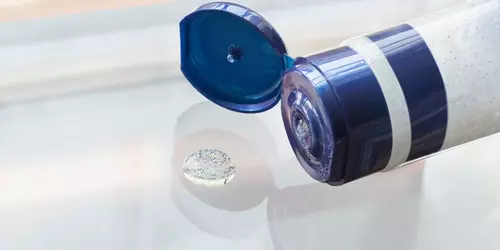11 Skincare Toxins to Avoid

Parabens are a family of chemical preservatives first introduced in the 1950s. They're used to prolong the shelf life of many grooming products by preventing mold and bacteria growth within them.
They've been linked to cancer and hormone disruption. Parabens can also sensitize the skin, causing allergic reactions.
You can find Parabens in shampoos, conditioners, body washes, and moisturizers.
Parabens are listed as:
- methylparaben
- propylparaben
- butylparaben
- thylparaben.
2. Phthalates
Phthalates are colorless, odorless, oily chemicals added to plastic to stop it becoming brittle.
They are also used as gelling agents (they help mix ingredients that would not usually mix) in some shampoos and in other grooming products to help them stick to your skin.
They've been linked to birth defects and hormone disruption and are being monitored by the FDA.
Phlalates are listed as:
- diethylphthalate
- monoethyl
3. Formaldehyde
Yes - the same stuff used to preserve corpses is also used in a range of grooming products to help keep them fresh by preventing microbiological growth.
Formaldehyde has strong links to asthma, neurotoxicity, cancer, and developmental toxicity.
Formaldehyde is listed as:
- formic aldehyde
- methanethiol
4. Fragrance/Parfum
"Fragrance" is an umbrella term. It could mean a combination of allergens, carcinogens, or irritants.
The name 'Fragrance' or 'Parfum' was developed to protect a company's trade secrets under the Fair Packaging and Labeling Act of 1966.
Fragrance/Parfum is listed as:
- fragrance
- parfums
If you're looking for a moisturizer that's free of artificial fragrance, moisturizes your face well and won't cause any irritations, check out our natural Face Moisturizer.
5. Mineral oil
Mineral oil is a clear, odorless liquid that has been used routinely for many decades in a wide variety of grooming products. It is cheap, fragrance-free, and colorless, doesn't oxidize, and can easily be kept for a long time - making it very popular in the grooming industry.
Mineral oil is an occlusive emollient, meaning that it helps to keep your skin hydrated by locking in moisture by forming a barrier on your skin's surface.
Exposure to mineral oils is strongly associated with an increased risk of nonmelanoma skin cancer, particularly the scrotum.
Mineral oil is listed as:
- paraffinum liquidum
- petrolatum
- cera microcristallina
- microcrystalline wax
- ozokerite
- ceresin paraffin
- paraffin
- synthetic wax
6. Butylated Hydroxytoluene (BHT)
BHT is a synthetic preservative that disrupts hormones, induces allergic reactions, and disrupts testosterone levels.
Long-term exposure to high doses of BHT causes liver, thyroid, and kidney problems in mice.
You can find BHT in moisturizers, antiperspirants, and exfoliators.
BHT is listed as:
- BHT
7. Aluminum
Aluminum is a common ingredient in antiperspirants. The aluminum compounds found in antiperspirants reduce perspiration by blocking your underarm sweat ducts.
It also minimizes body odor by inhibiting the odor-producing bacteria that feed on your sweat.
Some studies show that people exposed to high aluminum levels may develop Alzheimer's disease.
Aluminum is listed as:
- aluminum
- aluminum zirconium
- tetrachlorohydrex GLY
- aluminum chlorohydrate
8. Coal tar dyes
Coal tar is a mixture of many chemicals that come from petroleum. It serves a practical purpose in the treatment of dandruff, seborrhoea, and psoriasis.
Coal tar dyes contain small amounts of other heavy metal additives (such as aluminum). Coal tar is a human carcinogen and brain toxin.
You'll find Coal tar dyes in some hair dyes and other hair products.
- You can identify coal tar dye by a five-digit Colour Index (CI) number
- The US color name may also be listed ("FD&C" or "D&C" followed by a color name and number)
9. PEG compounds
PEGs (polyethylene glycols) are petroleum-based compounds used in grooming products as thickeners, solvents, softeners, and moisture-carriers.
If used on broken or damaged skin, PEGs can cause irritation and system toxicity. PEGs can reduce the skin's moisture levels and speed up skin aging.
PEG compounds are listed as:
- poly(ethylene oxide)
- poly(oxyethylene).
10. Siloxanes
Siloxanes make hair products dry quickly and they make creams apply more smoothly. Siloxanes have been shown to interfere with human hormone function.
Siloxanes are listed as:
- Cyclopentasiloxane
11. Triclosan
The cosmetic industry uses triclosan as a preservative to stop bacteria from growing on the product and spoiling it. It's a biocide (a product that controls harmful or unwanted organisms through chemical or biological means) in many other personal care products such as deodorants, soaps, and shower gels.
It strongly connects with the weakening of the immune system, uncontrolled cell growth, and developmental and reproductive toxicity.
You can find them in antibacterial soaps, deodorants, face washes, shower gels.
Triclosan is listed as:
- hydroxy diphenyl ether
12. Plastic microbeads
Microbeads are small, stable, manufactured plastic particles (made of polyethylene). They don't degrade or dissolve in water.
- Body - Microbeads can enter the body through dermal absorption. If they get into your eyes, they get stuck under the eyelids and scratch the eyeballs. Continued use of microbeads can lead to other infections due to the beads causing scarring, leaving your skin with abrasions. As a result, micro-scarring can make your skin vulnerable to bacterial attacks and other pollutants, further stressing your skin and speeding up the signs of aging.
- Environment - The pieces are small enough to pass through water filtration plants and therefore end up in lakes and rivers. You can find them in the Arctic sea-ice and on the ocean floor. A single shower can result in 100,000 plastic particles entering the ocean.
You'll find plastic microbeads in some face scrubs, body scrubs and exfoliators
Plastic microbeads are listed as:
- polyethylene (PE),
- polyethylene terephthalate (PET),
- nylon (PA),
- polypropylene (PP),
- polymethyl methacrylate (PMMA).
https://www.vitaman.com/blogs/news/toxic-skincare-ingredients





